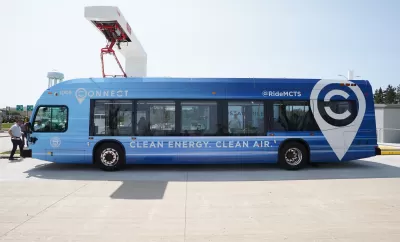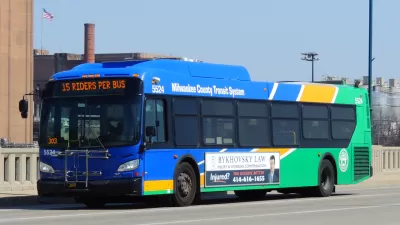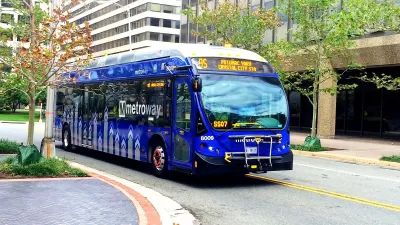The newly opened line is already reaching pre-pandemic ridership levels.

Milwaukee’s newest bus rapid transit (BRT) line is bringing transit riders back to the Milwaukee County Transit System (MCTS), reports Graham Kilmer in Urban Milwaukee, with an average of 2,800 riders per day—slightly more than 2019 ridership on the same corridor, pre-BRT.
Achieving pre-pandemic ridership levels is an achievement for any transit agency, as numbers continue to stagnate on many of the nation’s biggest systems. “Since MCTS began designing the new service it has estimated that by 2035 Connect 1 will average approximately 9,500 riders a day.”
Kilmer adds that “Since launching, the top destinations along the Connect 1 have been Downtown Milwaukee (700 rides per day), Marquette University (500 rides per day) and the Milwaukee Regional Medical Center (200 rides per day).” Connect 1 is also the first line in the system to use Battery Electric Buses (BEB), with “clean-diesels” serving as backup for peak times.
Rides on Connect 1 are free through the end of September.
FULL STORY: BRT Line Records Big Ridership Numbers

Study: Maui’s Plan to Convert Vacation Rentals to Long-Term Housing Could Cause Nearly $1 Billion Economic Loss
The plan would reduce visitor accommodation by 25,% resulting in 1,900 jobs lost.

North Texas Transit Leaders Tout Benefits of TOD for Growing Region
At a summit focused on transit-oriented development, policymakers discussed how North Texas’ expanded light rail system can serve as a tool for economic growth.

Using Old Oil and Gas Wells for Green Energy Storage
Penn State researchers have found that repurposing abandoned oil and gas wells for geothermal-assisted compressed-air energy storage can boost efficiency, reduce environmental risks, and support clean energy and job transitions.

Private Donations Propel Early Restoration of Palisades Playground
Los Angeles has secured over $1.3 million in private funding to restore the Pacific Palisades playground months ahead of schedule, creating a modern, accessible space that supports community healing after recent wildfires.

From Blight to Benefit: Early Results From California’s Equitable Cleanup Program
The Equitable Community Revitalization Grant (ECRG) program is reshaping brownfield redevelopment by prioritizing projects in low-income and environmental justice communities, emphasizing equity, transparency, and community benefits.

Planting Relief: Tackling Las Vegas Heat One Tree at a Time
Nevada Plants, a Las Vegas-based nonprofit, is combating the city’s extreme urban heat by giving away trees to residents in underserved neighborhoods, promoting shade, sustainability, and community health.
Urban Design for Planners 1: Software Tools
This six-course series explores essential urban design concepts using open source software and equips planners with the tools they need to participate fully in the urban design process.
Planning for Universal Design
Learn the tools for implementing Universal Design in planning regulations.
Ascent Environmental
Borough of Carlisle
Institute for Housing and Urban Development Studies (IHS)
City of Grandview
Harvard GSD Executive Education
Toledo-Lucas County Plan Commissions
Salt Lake City
NYU Wagner Graduate School of Public Service





























